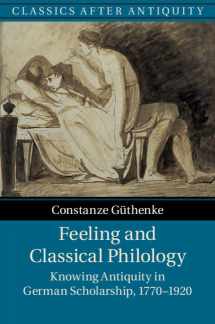
Feeling and Classical Philology: Knowing Antiquity in German Scholarship, 1770–1920 (Classics after Antiquity)
Book details
Summary
Description
Nineteenth-century German classical philology underpins many structures of the modern humanities. In this book, Constanze Güthenke shows how a language of love and a longing for closeness with a personified antiquity have lastingly shaped modern professional reading habits, notions of biography, and the self-image of scholars and teachers. She argues that a discourse of love was instrumental in expressing the challenges of specialisation and individual formation (Bildung), and in particular for the key importance of a Platonic scene of learning and instruction for imagining the modern scholar. The book is based on detailed readings of programmatic texts from, among others, Wolf, Schleiermacher, Boeckh, Thiersch, Dilthey, Wilamowitz and Nietzsche. It makes a case for revising established narratives, but also for finding new value in imagining distance and an absence of nostalgic longing for antiquity.


We would LOVE it if you could help us and other readers by reviewing the book
Book review



